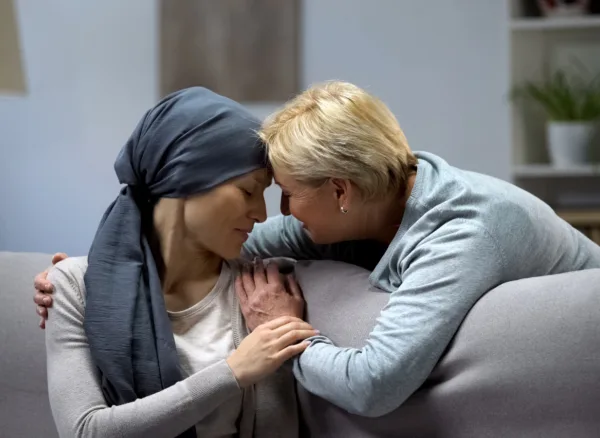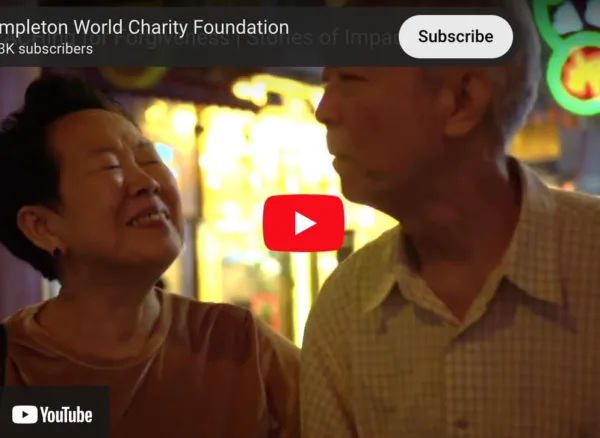Menu

April 20, 2023 - A team of international researchers are sharing today a new study that illustrates the power of forgiveness in decreasing anxiety and depression and improving overall well-being. The study represents the largest exploration of forgiveness science to date and is a topic of discussion at “Forgiveness: Interdisciplinary Perspectives,” a conference that continues into the weekend at Harvard University.
“Over the past 20 years, investment and research into the power of forgiveness has accelerated. The resulting science sends a clear message that forgiveness works. It has a significant impact on mental health, physical health, and on our relationships to one another at the interpersonal and even societal levels,” said Andrew Serazin, president of Templeton World Charity Foundation (TWCF), which funded the research and is co-sponsoring the conference. “At a time when our world feels more polarized and fractured than ever, it is critical that we amplify this research and share the practical, accessible tools that make forgiveness possible for more people.”
The study, a randomized controlled trial, was conducted using the REACH Forgiveness model, a general public-health-oriented approach created by Dr. Everett Worthington, a licensed clinical psychologist and Commonwealth Professor Emeritus of Psychology at Virginia Commonwealth University. The trial had 4,598 participants—more than all previous research on forgiveness interventions combined.
“I have been studying forgiveness as a tool for improving peoples’ lives and relationships for more than 40 years. What is particularly exciting about this research is that it uses a self-guided workbook that is free, available online, and translated into six languages. It distills the necessary processes into only a few hours, making the life-changing power of forgiveness more accessible to people and communities around the world,” said Worthington.
The REACH workbook is available at REACH.DiscoverForgiveness.org, a digital hub of forgiveness research and resources launched by TWCF in December 2021.
In the trial, individuals who received the workbook saw an increased ability and disposition to forgive, a reduction in depression and anxiety symptoms, and an increase in flourishing compared to those with delayed receipt of the workbook. Also of note is that trial participants came from Hong Kong, Indonesia, Ukraine, Colombia, and South Africa, countries that have all faced civil conflict or unrest in the recent past.
“Forgiveness is complex, as evidenced by the global context in which we conducted this research. But forgiveness and justice are not mutually exclusive, and I believe the benefits that begin at the individual level have the power to heal communities and improve quality of life on a larger scale,” said Man Yee Ho, a principal investigator of the research and an honorary research fellow in the Divinity School of Chung Chi College at the Chinese University of Hong Kong. Ho and her fellow researchers, including Tyler VanderWeele, said that the research shows that the intervention can be used as a supplemental therapeutic and preventative approach to improving mental health.
“Forgiveness, while often overlooked in health care discussions, is an issue of public health. The growing body of research reinforces the efficacy of forgiveness interventions in improving many aspects of human flourishing, from mental health to happiness, character, and even our sense of hope,” said VanderWeele, who is the John L. Loeb and Frances Lehman Loeb Professor of Epidemiology in the Departments of Epidemiology and Biostatistics at the Harvard T.H. Chan School of Public Health, Director of the Human Flourishing Program, and Co-Director of the Initiative on Health, Spirituality, and Religion at Harvard University.
The Human Flourishing Program at Harvard played an essential role in convening leaders to discuss this research and forgiveness, more broadly. “Forgiveness: Interdisciplinary Perspectives,” was hosted by Harvard’s Memorial Church and the Human Flourishing Program at Harvard’s Institute for Quantitative Social Science. Templeton World Charity Foundation served as a co-sponsor, along with the Initiative on Health, Religion, &; Spirituality, the Making Caring Common Project (Harvard Graduate School of Education), the Religion Conflict and Peace Initiative (Harvard Divinity School), and the Harvard Catholic Forum.




